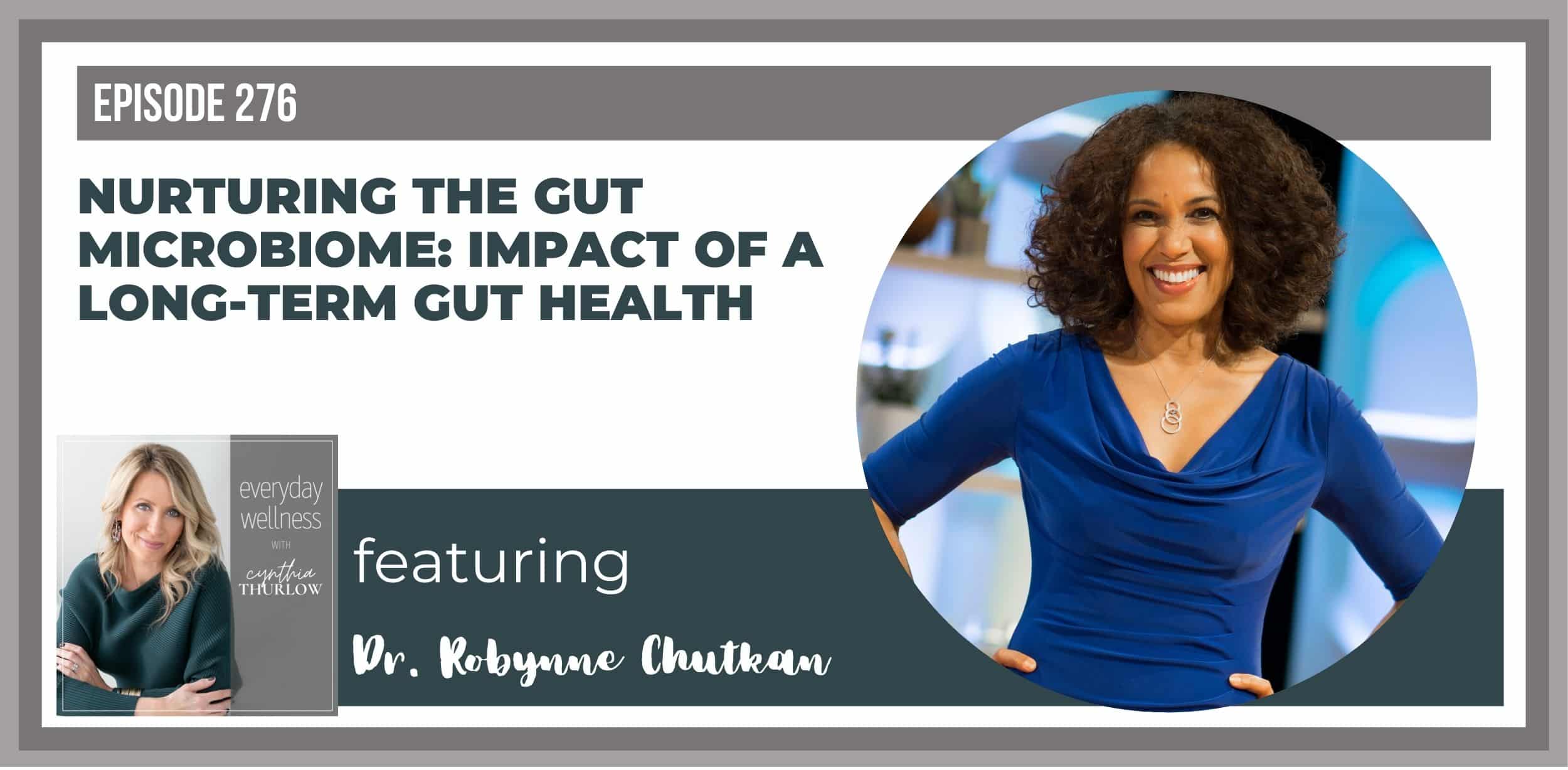Summary of Ep. 276 Nurturing the Gut Microbiome: Impact of a Long-Term Gut Health:
Dr. Robynne Chutkan, a well-known gastroenterologist and author of the book Anti-Viral Gut, discusses the importance of the microbiome in the body. The microbiome refers to the organisms and genes living in and on our bodies, mainly in the gastrointestinal (GI) tract. We learn about the impact of medications on gut health, the role of dysbiosis and the Estrobolome, and the influence of the pharmaceutical industry on medical practice and healthcare providers. Dr. Chutkan also shares tips on how to support a healthy gut, including consuming 30 plant types per week. The microbiome is crucial to our immune system, with 70-80% of it physically located in the gut. Other topics covered in the podcast include the importance of stomach acid, exercise, sleep, stress, and alcohol on gut health.
*****
Understanding the Gut Microbiome: A Conversation with Dr. Robynne Chutkan
The gut microbiome has gained significant attention in the recent past due to its critical role in human health. Dr. Robynne Chutkan, a renowned gastroenterologist and author of “Anti-Viral Gut,” joins Cynthia Thurlow in a fascinating conversation about the physiology of the microbiome and its interplay with immunology. In this article, we delve into the highlights of their conversation, including the impact of medications, dysbiosis, Estrobolome, sleep, exercise, stress, alcohol, and dietary tips to support a healthy gut.
What is the microbiome, and why is it important?
The microbiome refers to a collection of microorganisms, including bacteria, viruses, protozoa, fungi, parasites, and archaea, present within and on the human body. Generally, these microorganisms are beneficial and play a crucial role in health maintenance, immune system regulation, nutrient absorption, and toxin elimination. Dr. Chutkan highlights that the entire ecosystem weighs around four to five pounds, making it one of the most significant organs in the body.
Why is the interrelationship between the oral microbiome, gut microbiome, and vaginal microbiome crucial?
Dr. Chutkan explains that the microbiome in the mouth, gut, and vagina is interrelated and critical for overall health. Various strains of bacteria in the mouth protect against tooth decay and gum disease. In the gut, a healthy microbiome helps absorb nutrients, regulate the immune system, and control inflammation, while in the vagina, microbiota prevent infections and keep the pH levels balanced.
The importance of stomach acid
Stomach acid plays a pivotal role in the digestive system. Dr. Chutkan emphasizes its importance in denaturing proteins, activating enzymes, and regulating the pH. Low stomach acid can lead to malabsorption of nutrients, bacterial overgrowth, and increased inflammation. Therefore, maintaining optimal stomach acid levels is critical for a healthy gut.
How do proton pump inhibitors affect gut health?
Proton pump inhibitors are commonly prescribed to treat stomach acid-related disorders, such as gastroesophageal reflux disease (GERD). However, these medications can impact the gut microbiome negatively. Dr. Chutkan explains that proton pump inhibitors can lead to acid suppression, which in turn alters the pH level, creates an ideal environment for harmful bacteria, and potentially contribute to dysbiosis.
The role of dysbiosis and Estrobolome
Dysbiosis is a microbial imbalance in the gut, commonly caused by poor diet, stress, medications such as antibiotics, and lifestyle factors. Dr. Chutkan mentions that dysbiosis can lead to various health issues, including autoimmunity, obesity, and cancer. Estrobolome, a group of bacteria that help modulate estrogen levels, is important for women’s health. Dysbiosis in the gut can negatively impact the Estrobolome, leading to hormonal imbalances and other health issues.
The impact of sleep, exercise, stress, and alcohol on the gut
Dr. Chutkan explains how lifestyle factors such as sleep, exercise, stress, and alcohol can influence gut health. Lack of sleep can impact the immune system and lead to inflammation in the gut. Exercise contributes to a healthy microbiome by increasing the diversity of gut bacteria. Alcohol, when consumed in excess, can harm gut bacteria, leading to inflammation and other health issues. Similarly, stress can lead to dysbiosis in the gut and impact overall health and well-being.
Dietary tips to support a healthy gut
Dr. Chutkan offers several tips to support a healthy gut, emphasizing the importance of consuming nutrient-dense whole foods, eliminating processed foods, and reducing sugar intake. She also recommends incorporating prebiotics and probiotics into the diet to foster a healthy microbiome. Dr. Chutkan advocates consuming 30 plant types per week to support a diverse gut ecosystem.
Conclusion
In conclusion, the gut microbiome plays a pivotal role in overall health and well-being, and understanding its importance is crucial. Dr. Chutkan’s insights into the physiology of the microbiome and its interplay with immunology highlight the significant impact of lifestyle factors on gut health. By incorporating dietary tips and lifestyle changes that support a healthy gut, individuals can take steps towards achieving optimal health.

